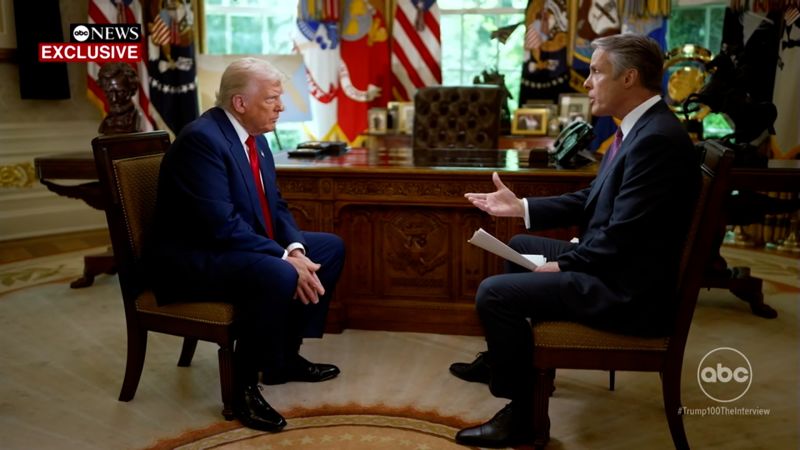Washington
CNN
—
President Donald Trump falsely claimed Tuesday that he warned during his 2024 campaign that his tariffs would require Americans to experience a “transition period.”
In reality, Trump’s 2024 campaign rhetoric about tariffs was reliably glowing and warning-free; he said his tariffs would make Americans “so rich” and that they were “not going to be a cost to you.” On Wednesday, even the White House couldn’t find any examples of Trump having said during the campaign that Americans would face a “transition period” or anything similar.
Trump’s Tuesday claim, in an interview with ABC News, was the second time in a week he tried to rewrite the history of his 2024 campaign remarks. In an interview with Time magazine the previous Tuesday, he falsely claimed his dozens of promises to immediately end the war in Ukraine were said “in jest.”
In the ABC News interview, journalist Terry Moran mentioned to Trump that economists say his tariffs will raise prices. Moran then noted Trump said in a social media post in early April that Americans should “hang tough” amid his trade battles and that “it won’t be easy” (before, he said, the US wins).
As Moran was asking Trump whether Americans should indeed expect “some hard times,” Trump said: “I’ve said that during my campaign.”
Trump added moments later: “I said all of these things during my campaign. I said, ‘You’re gonna have a transition period.’”
But he didn’t say that during the campaign.
A CNN review of Roll Call’s Factba.se database, the most comprehensive public database of Trump’s comments, turned up no examples of Trump warning during the campaign of a “transition period,” or anything like that, related to tariffs or his economic agenda; he used the word “transition” in the context of transgender people and the presidential transition process before Inauguration Day.
When CNN asked the White House on Wednesday for any evidence for Trump’s claim about his campaign rhetoric, a White House official responded, on condition of anonymity, by providing a single link – to a comment Trump made in an interview more than a month after the election, as president-elect, in which he said he “can’t guarantee” Americans wouldn’t have to pay more because of tariffs.
Even in that interview, Trump said “I don’t believe that” consumers ultimately pay tariffs. Regardless, a post-campaign comment clearly doesn’t corroborate Trump’s claim about what he said during the campaign.
Trump’s rosy campaign rhetoric on inflation and tariffs
Trump started issuing explicit warnings about tariffs during his presidency, saying in late January that “there could be some temporary short-term disruption” and using the phrase “transition period” in March and April as criticism of his tariff plans mounted.
During the 2024 campaign, however, Trump repeatedly vowed he would reduce prices without delay and that tariffs would make the US wealthy without harming American consumers.
“So, when I win, I will immediately bring prices down,” he said at an August 2024 press conference. At various 2024 rallies, he recited this promise: “Starting on day one, we will end inflation and make America affordable again.” He emphasized speed at rallies two days before Election Day, saying, “Wait ’til you see how fast we’re going to get it going. We’ll get the prices down,” and, “We’re going to get those prices down.
We’re going to get them down quickly.”
Trump spoke in cheery terms about tariffs even in the context of inflation.
When one 2024 interviewer told him his tariffs could have a massive effect on the economy, he responded, “I agree it’s going to have a massive effect – positive effect.” He pledged at another 2024 event, “Smart tariffs will not create inflation. They will combat inflation.” And though it is US importers who make the tariff payments and often pass them on to consumers, he repeatedly claimed that tariffs would only raise costs on foreign countries, not Americans.
Top Trump ally Elon Musk said late in the campaign that his planned cuts to federal spending would “involve temporary hardship” while ensuring “long-term prosperity.” Trump did not speak of the possibility of “temporary hardship.”

